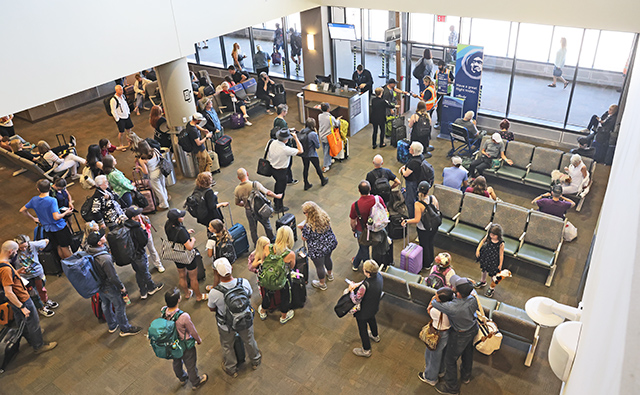Amazon turns to tax-averse California in ‘unusual’ strategy
Published 5:00 am Monday, July 18, 2011
SAN FRANCISCO — Californians have shown a penchant for rolling back taxes at the ballot box, a history Amazon.com may be banking on to repeal a law aimed at forcing it to collect state sales levies.
Voters don’t have an appetite for new taxes given the lack of trust in state government and will take a referendum “very seriously,” said Mark Baldassare, president of the Public Policy Institute of California in San Francisco. In November, Californians refused to end $1.3 billion in corporate tax breaks and made it harder to raise fees on businesses.
Amazon, the world’s largest Web retailer, has filed a proposed referendum to repeal the tax measure with the California attorney general’s office. If enough voters sign qualifying petitions, the issue may be placed on a ballot as soon as February. A win for the retailer may block more than $300 million in revenue from state coffers.
‘Unusual route’
“It certainly makes sense that the company would go to the voters on this, but the referendum is an unusual route,” said Baldassare, whose organization is nonpartisan. “The referendum, which is the ability to change the law that’s already been made, is not something that is very commonly done.”
The Legislature required online retailers to collect sales taxes last month, as part of the fiscal 2012 spending plan. The change is forecast to generate about $317 million in receipts, including $83 million from Seattle-based Amazon, according to Anita Gore, a spokeswoman for the state agency that oversees taxes. The budget projects $200 million in revenue.
Amazon had called the measure “unconstitutional” and “counterproductive” before it became law.
“We support this referendum against the recent sales-tax legislation because, with unemployment at well over 11 percent, Californians deserve a voice and a choice about jobs, investment and the state’s economic future,” Paul Misener, vice president of global public policy, said in a July 11 statement.
Amazon spokeswoman Mary Osako declined to comment on the company’s strategy in seeking the referendum, deferring to Misener’s statement.
Affiliates cut off
The retailer has severed ties with its California affiliates and hasn’t been collecting taxes on purchases made by California residents since the law passed, Osako said. Misener previously said that cutting off affiliates would affect more than 10,000 website operators who get fees from the company.
Amazon isn’t collecting sales taxes for the state because it only does business in California online, Osako said.
The Supreme Court ruled in 1992 that states may require companies to collect sales levies if they have a physical presence in the state. States including Massachusetts require consumers to declare online purchases that haven’t been taxed and pay the levy on their tax returns.
Proponents of the California law say it puts Amazon on an equal footing with retailers that already collect taxes on online sales. The state levy is 7.25 percent.
“If I purchase from Nordstrom online, I pay a sales tax,” Nancy Skinner, an Assembly Democrat from Berkeley who helped draft the law, said in a telephone interview. “Why should Amazon operate under a different set of rules?”
Voters weren’t receptive to tax-increasing proposals on the ballot in November, said Jennie Bowser, a senior fellow at the National Conference of State Legislatures in Denver. She said Amazon’s strategy has been tried before.
A proposition to delay the implementation of clean air standards in California was sponsored almost entirely by the energy industry, Bowser said. Costco was behind a Washington initiative to end state-controlled liquor sales while letting high-volume retailers buy direct from producers instead of wholesalers, she said.
Petition voters
Amazon would need to present almost 505,000 signatures from California voters to qualify the measure for the ballot.
Losing $200 million if the referendum passes “is not insignificant,” considering lawmakers cut more than $1 billion from higher education, according to Sen. Mark Leno, a San Francisco Democrat who leads his chamber’s budget panel.
The measure may spark a battle between corporate titans, pitting Amazon against Wal-Mart Stores and Target, which operate stores in the state, Leno said by telephone.






